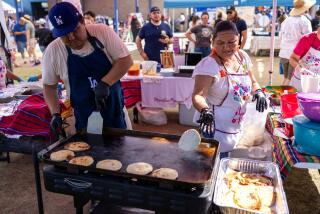Pachuco Folk Heroes — They Were First to Be Different
- Share via
Folk heroes arise of a need to articulate feelings unsung by conventionality.
Our real leaders, that is, people who actually run the country, are rarely inspirational enough to satisfy our need for romantic self-identity.
The Bob Dylans, Che Guevaras and Joe DiMaggios represent not a practical way of life but a spirit, an inspiration needed by hero makers.
This make help explain why the pachuchos or zoot suiters of the early forties are becoming folks heroes in the eyes of Chicanos from colleges to prisons.
An East Los Angeles College publication, La Vida Nueva (The New Life), in its current issue, carries an article about pachucos which depicts them as heroic victims of the Establishment.
At McNeil Island Federal Penitentiary in Washington, a group of pintos (which is what Chicano prisoners call themselves) recently published a booklet which says that the pachuchos “were the the true vanguards of the present Chicano social revolution.”
The booklet, written by the pintos after a seminar in the prison attended by, among others, a Harvard sociologist, a representative of the U.S. Department of Justice and Mexican-American leaders, says:
“During the early 1940’s there were a group of young Chicanos who were artos (fed up) with the System. They wore their hair long, went against the norm by dressing unconventionally and confronted Society with a defiant attitude. They were pachucos. These Chicanos were the first to protest and rebel by direct confrontation with the Establishment ...”
The college publication article and the prison booklet stem from a deep desire by young Chicanos and alienated Mexican-Americans to understand their uniqueness as Americans.
Pachuchos are becoming folk heroes because they were rebels. And sensitive people need to understand rebellion because they know it is not created in a vacuum. There’s always a reason for rebellion.
A Beverly Hills reader recently wrote me that this column’s “emphasis on Chicano militants and leftists does a disservice to the vast majority of Mexican-Americans who are predominately a dignified and hard-working people.”
The reader continues: “By nature they (Mexican-Americans) are not competitive and ambitious as Japanese, Jews or Europeans, but many will continue to improve their economic status to the degree permitted by their ambitious mainly, and secondly by their maintenance of a decent and non-threatening image to Anglos who are basically a fair-minded people unless they feel threatened ...”
“Why,” asks the teacher, “should any Anglo care about what happens” to pachucos or the latter-day version, the batos locos (crazy guys).
The reader then reminds us, and probably correctly so, that “we (Anglos) are very ready to crush the bato loco if he gets too carried away and goes the route of the pachuco ... I have had many a run with them and know that the bato loco will be dealt with even more harshly (than with the pachuco) because are entering a phase of being fed up with unsafe streets and you will find that the best thing you can do for Mexican-Americans is to avoid emphasis on such dregs and outcasts ...”
In other words, this column should tell Chicanos to shape up and fly right because, as the reader puts it, “to the degree that they (Mexican-Americans) learn our language and show a desire to advance and acquire skills, to that degree will they prospoer and be accepted by the majority.”
It is odd that this Anglo reader from Beverly Hills should demand from Chicanos what Anglos are finding increasingly difficult to demand of Anglo youths: unquestionable acceptance of the System.
He might remember that hippies more or less copied their outlandishness from the pachucos, and with impunity yet. As a boy I came to California once during the early forties and I was asked by concerned older friends to remove my sport jacket because it was about an inch longer than was conventionally thought proper and I might be mistaken for a pachuco.
This came to mind recently as I sat in the Music Center Pavilion, in my conservative business suit, next to an Anglo man with hair to his shoulders, striped bell bottom trousers and a psychedelic shirt.
Then I remember what Octavio Paz, Mexican poet-essayist-diplomat, said about why the pachuco flaunted his differences.
“The purpose of his grotesque dandyism and anarchic behavior,” wrote Paz, “is not so much to point out the injustices and incapacity of a society that has failed to assimilate him as it is to demonstrate his personal will to remain different.”
Pachucos are becoming folk heroes because of the yearning in all of us to be individuals first and part of a System second.
More to Read
Sign up for Essential California
The most important California stories and recommendations in your inbox every morning.
You may occasionally receive promotional content from the Los Angeles Times.














